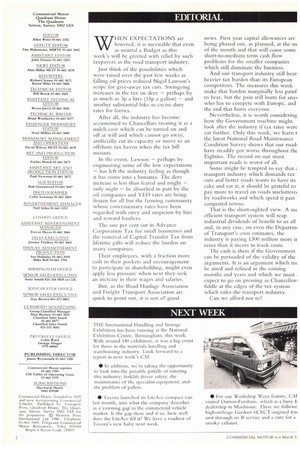W HEN EXPECTATIONS are lowered, it is inevitable that even as
Page 2

If you've noticed an error in this article please click here to report it so we can fix it.
neutral a Budget as this week's will be greeted with relief by such taxpayers as the road transport industry.
Just think of the possibilities which were raised over the past few weeks as falling oil prices reduced Nif.r,e1 Lawson's scope for give-away tax cuts. Swingeing increases in the tax on dery — perhaps by as much as 3p a litre (I5p a gallon) — and another substantial hike in excise duty rates for lorries.
After all, the industry has become accustomed to Chancellors treating it as a milch cow which can be turned on and off at will and which cannot go away, artificially cut its capacity or move to an offshore tax haven when the tax bill mounts.
In the event, Lawson — perhaps by engineering some of the low expectations — has left the industry feeling as though it has come into a bonanza. The dery increase is less than feared and might — only might — be absorbed in part by the oil companies and VED rates are being frozen for all but the farming community whose concessionary rates have been regarded with envy and suspicion by hire and reward hauliers.
The one per cent cut in Advance Corporation Tax for small businesses and the removal of Capital Transfer Tax from lifetime gifts will reduce the burden on many companies.
Their employees, with a fraction more cash in their pockets and encouragement to participate in shareholding, might even apply less pressure when next they seek an increase in their wages and salaries.
But, as the Road Haulage Association and Freight Transport Association arc quick to point out, it is not all good news. First year capital allowances are being phased out, as planned, at the en of the month and that will cause some short-to-medium term cash flow problems for the smaller companies which still dominate the business.
And our transport industry still bear: heavier tax burden than its European competitors. The measures this week make that burden marginally less painf to bear, but the pain still hurts for any who has to compete with Europe, and the end that hurts everyone.
Nevertheless, it is worth considering how the Government machine might look after the industry if tax rates were cut further. Only this week, we learn t the latest National Road Maintenance Condition Survey shows that our road have steadily got worse throughout the Eighties. The record on our most important roads is worst of all.
Some might he tempted to say that transport industry which demands tax cuts and better roads wants to have its cake and eat it; it should be grateful to pay more to travel on roads unclutterei by roadworks and which speed it past congested towns.
That is the short-sighted view. A nu efficient transport system will reap industrial dividends of benefit to us all and, in any case, on even the Departm, of Transport's own estimates, the industry is paying £300 million more it taxes than it incurs in track costs.
The cash is there if the Government can be persuaded of the validity of the arguments. It is an argument which mi be aired and refined in the coming months and years and which we must . expect to go on pressing as Chancellor: fiddle at the edges of the tax system which rules the transport industry.
Can we afford not to?






















































































